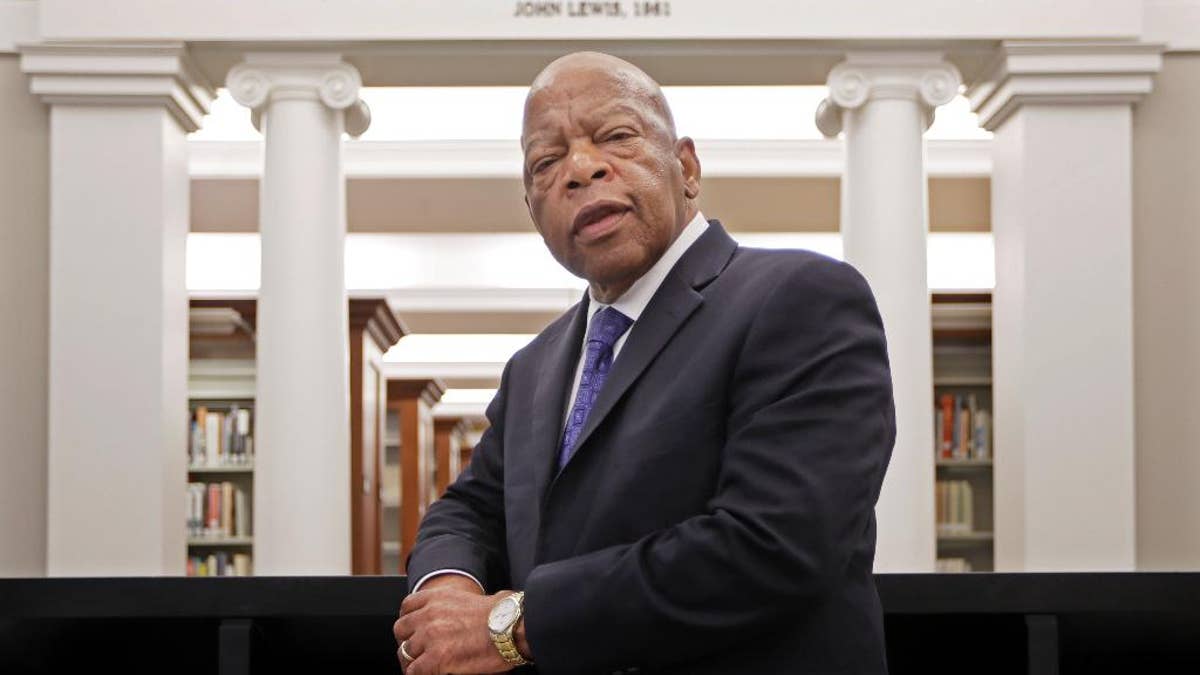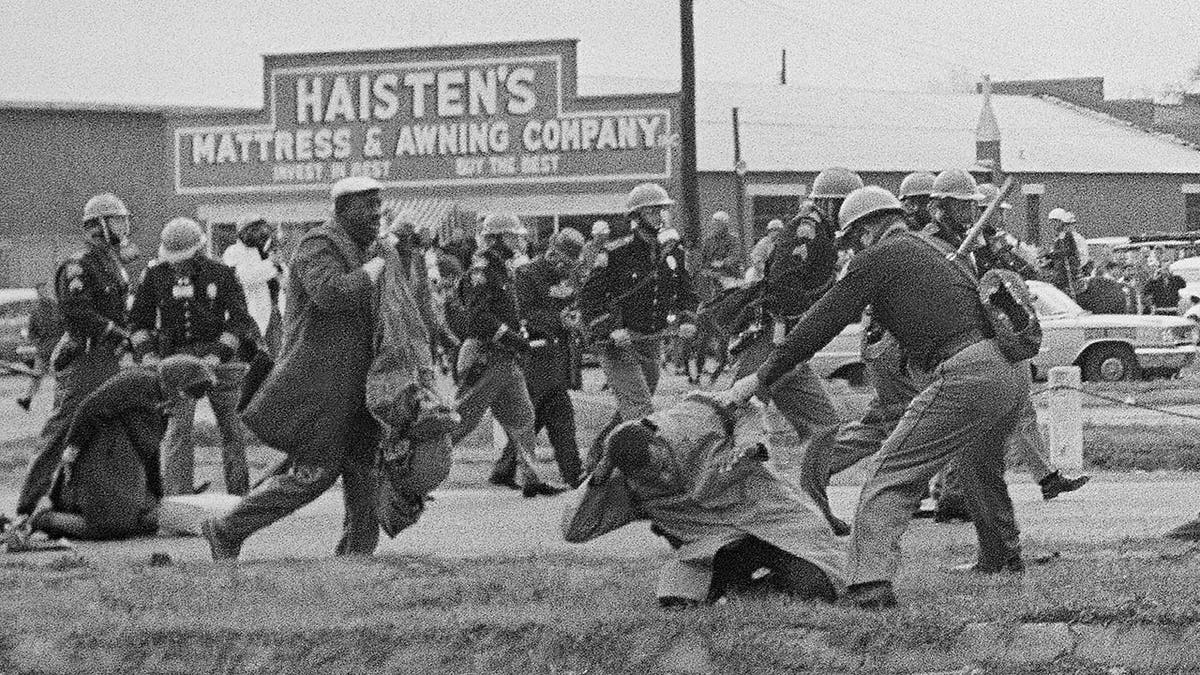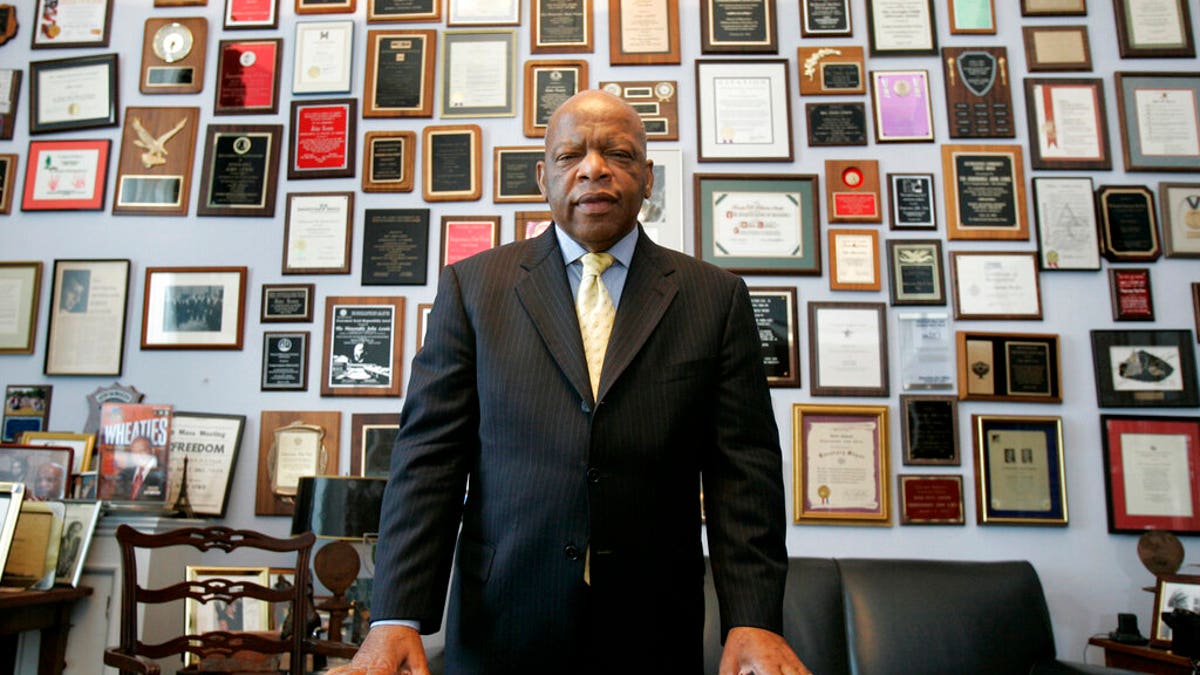Remembering Congressman John Lewis, civil rights icon
Fox News Congressional correspondent Chad Pergram pays tribute to U.S. Rep. John Lewis, one of the nation’s most preeminent civil rights figures, on ‘CAVUTO Live.’
I always remembered the handshake of the late Rep. John Lewis (D-GA). Soft. Welcoming. It was peaceful. Calm flowed through Lewis’s palm, transferred into yours.
Yet, the handshake was strong.
That was the quintessence of John Lewis. The dichotomy. There was the calm. And there was the fury.
Lewis would always say hello in the Congressional hallways. He was always asking how you were doing. How you were feeling.
“How are you, my brother?” he would ask coming off the House floor, heading toward the elevators, sometimes placing a hand on your shoulder or upper arm.
“How are you, my friend,” Lewis would inquire in the tunnel stretching between the Capitol and the Cannon House Office Building.
TRUMP, PELOSI ORDER FLAGS AT HALF-STAFF TO HONOR JOHN LEWIS; POSSIBLE HE COULD LIE IN STATE
Yet, as soothing as his demeanor in casual conversation, Lewis could be fire and lightning.
If Lewis spotted a transgression, an imbalance of justice, a wrong which deserved a right, he would unleash verbal thunder on the House floor. Health care. Tax policy. Food and medicine for the sick. Aid for the oppressed.
This was John Lewis split. Speaking truth to power. Delivering the heat. Yet a gentle soul who practiced non-violent protest. Just sitting, hands folded, at segregated lunch counters and drug stores in the 1960s. Making his point. Unveiling the injustices of division and separation.
There was that soft handshake.
But also steel.
Steel was in Lewis’s resolve. But also, a part of him, too.
Lewis and activist Hosea Williams led hundreds of demonstrators more than 50 miles from Selma, AL to Montgomery on March 7, 1965. This was the push for voting rights.
JOHN LEWIS, CIVIL RIGHTS ICON, CONGRESSMAN FOR 33 YEARS, DEAD AT 80

This Nov. 18, 2016 file photo shows Rep. John Lewis, D-Ga., in the Civil Rights Room in the Nashville Public Library in Nashville, Tenn. (AP)
Alabama State troopers waited for the protesters across the Edmund Pettus Bridge. Pettus himself was a Grand Dragon in the Ku Klux Klan. He served a decade in the U.S. Senate, representing Alabama. Pettus was also a Confederate military figure who fought against the U.S.
And now, Pettus is indelibly linked to one of the most ugly, ignominious events in American history: Bloody Sunday.
The state police wielded truncheons and clubs. Mayhem ensued when the protesters crossed the bridge. Troopers beat Lewis in the head, concussing the future Congressman and fracturing his skull. Doctors would later insert a steel plate into Lewis’s head.
There was the calm. The warm, gentle handshake. And the steel. Both in Lewis’s determination and a physical manifestation of injustice which he will carry to his grave.
Pictures of the march and the violence accelerated passage in Congress of the 1965 Voting Rights Act.
Years later, Lewis would lead an annual pilgrimage of lawmakers to Alabama and walk arm-in-arm across the Pettus Bridge, commemorating the event. Lewis often spoke of the crossing as a reminder of progress on race and social justice issues. But he also noted the U.S. had miles to go in its journey.

In this March 7, 1965, file photo, a state trooper swings a billy club at John Lewis, right foreground, chairman of the Student Nonviolent Coordinating Committee, to break up a civil rights voting march in Selma, Ala. Lewis sustained a fractured skull. Lewis, who carried the struggle against racial discrimination from Southern battlegrounds of the 1960s to the halls of Congress, died Friday, July 17, 2020. (AP)
Lewis’ death comes weeks after mass, Black Lives Matter protests in major cities and rural hamlets across the country. The murder of George Floyd at the hands of police, ignited the protests. It serves to remind the nation of the road yet ahead.
Lewis was always concerned about passing on the story of the civil rights movement to younger generations. The Congressman would frequently meet in his office with groups of students and show a film about the 1960s and non-violent protest. Yet, it was pop culture which may have burrowed Lewis deeper into the nation’s conscience.
Marvel released its blockbuster “The Black Panther” in 2018. It was the first major film depicting a black superhero. At the time, multiple scribes characterized Lewis as the original black superhero. No Wakanda here. Writers designated Lewis as the real Black Panther, fighting for justice and equality.
I spoke to Lewis in the Cannon tunnel shortly after the film hit the screens. I hadn’t watched the movie yet. But Lewis had. Lewis said he appreciated the Black Panther comparison. But for the Congressman, it was never about him.
“Watch the role of the women,” Lewis said talking about the movie.
In the film, the women are brilliant scientists, leaders and talented warriors.
That was the equality which Lewis sought in real life.
To this day, John Lewis remains the only lawmaker with whom I have discussed Marvel superheroes.
Sometimes the older tactics work best.
Lewis and Rep. John Larson (D-CT) engineered a sit-in on the House floor for more than 24 hours after the Pulse Nightclub shooting in Orlando, FL, in June, 2016.
Dozens of other members filed in, some sitting in the chamber and delivering speeches. But Lewis and Larson plopped right down on the carpet in front of the dais.
This could have been a lunch counter at Woolworth in Nashville or someplace else in the south in the 1960s. But this protest was the House chamber. Some Republicans demanded that the House Sergeant at Arms arrest and remove Lewis and his colleagues. Lewis wasn’t looking for a confrontation. He was looking for action to curb the scourge of gun violence. Republicans were in the majority at that point. But everyone knew that escorting Lewis and others out of the chamber would prompt the worst possible optic for the GOP.
House Speaker Paul Ryan (R-WI) later implemented disciplinary measures for future House protests. But Lewis and others made their point.
House Majority Whip Jim Clyburn (D-SC) often spoke of how his bids for public office were launched decades before from jail, incarcerated due to protests. Clyburn was a friend of Lewis for six decades. Early Saturday morning, Clyburn released a video to pay homage to his friend.

In this Thursday, May 10, 2007 file photo, U.S. Rep. John Lewis, R-Ga., in his office on Capitol Hill, in Washington. Lewis, who carried the struggle against racial discrimination from Southern battlegrounds of the 1960s to the halls of Congress, died Friday, July 17, 2020. (AP)
Clyburn stands solemnly in a white shirt, low, orange morning rays, glinting off his eyeglasses.
“Last night, when I was informed of the death of my longtime friend, John Lewis, I sat alone for a moment, thinking about what John meant to this country. To this movement. And, to me, as a person,” said Clyburn.
The South Carolina Democrat sat in the dark, close to midnight. But Clyburn spoke at daybreak.
“I am doing this tape during sunrise, because I do believe that as the sun set on John Lewis’s life last night, the sun rises on a movement that will never die,” said Clyburn.
CLICK HERE FOR THE FOX NEWS APP
The sun set Friday night on the life of John Lewis. But to Clyburn and others, Lewis’s passing means it’s really daybreak.














































